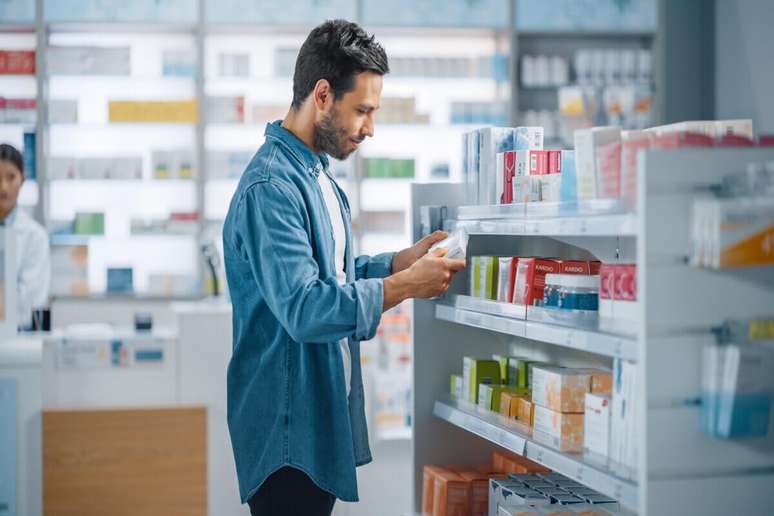Find out how some precautions are important to ensure the effectiveness of the medicine and prevent health problems
When we leave the doctor’s office with prescription medications in hand, we sometimes have questions about these products. How to ingest it, how it will act in the body, what to do after its expiry, are some of the questions. Help can come from the pharmacist’s guide at the time of purchase, at the time of collection from health centers or municipal pharmacies.
“The doctor makes the diagnosis and the best prescription. The pharmacist is the professional who provides information regarding the medicine and how to best use it. The patient can ask the pharmacist, since the mission of this professional is to increase awareness about safety and rational use of drugs”, explains Alessandra Pineda do Amaral Gurgel, Director of Pharmaceutical Assistance at the Alemão Oswaldo Cruz Hospital.
To clarify the use of medicines, the professional clarifies some myths and truths. Watch!
1. The best way to take a pill is with water
REAL. The absorption of the drug by the body depends on its presentation and the patient’s metabolism. Presentations generically referred to as “tablets” are pills, capsules, granules and coated tablets. The best way to ingest it is with waterfall. “Some medicines cannot be taken with milk or juice, others must be consumed close to meals, as they are absorbed better. Those who take them with water are less likely to make mistakes,” explains the specialist.
2. Taking the drugs on a full stomach reduces the effect
Myth. It is advisable to take some medicines after meals due to the possibility of causing gastric irritation and others because they are absorbed better. “A vitamin Dfor example, it is fat-soluble and, by binding to the fats of foods, it is better absorbed if taken during meals”, explains Alessandra Pineda do Amaral Gurgel, who recalls the importance of respecting the times prescribed for taking drugs, especially antimicrobials.
“There are cases, such as that of the antibiotic ciprofloxacin, which must be administered two hours after the consumption of dairy products or foods enriched with minerals such as iron, magnesium and zinc, since their absorption can be compromised if consumed with foods or drinks containing these minerals. Therefore, it is important to be informed about how to use the medicine”, explains the professional.

3. Liquid medications take effect faster
REAL. Liquids or solutions do not undergo the dissolution process within the body like tablets; therefore they are absorbed more quickly. “It works faster because it is ready to be absorbed by the body body“, says the pharmacist.
4. Taking the medicine days after it expires will not hurt
Myth. Beyond the expiration date, the manufacturer of the drug cannot guarantee that it will work in its entirety. “The industry carries out validity tests in extreme situations such as high temperatures, humidity, incidence of light, among others, to estimate a maximum period during which the medicinal product will maintain its characteristics of efficacy and safety for use. Beyond outside this period, there is no guarantee that its use will be safe”, underlines the expert.
Alessandra Pineda do Amaral Gurgel also emphasizes that, in addition to the expiry date, the patient must be aware of the storage conditions of the drug. “The required storage conditions must be respected such as: temperature, humidity and protection from sunlight”, explains the professional.
5. Consumption of alcohol does not hinder the effect of drugs
Myth. Alcohol intake can alter the metabolism of drugs in the body, increasing adverse reactions. Medicines that act on the central nervous system, such as tranquilizers, may have a greater effect.
Some antibiotics, when used with alcohol, can lead to serious antabuse-like effects, which refer to the accumulation of toxic metabolites, which can cause vomiting, heachache, palpitation, hypotension, respiratory difficulty up to death. “Alcoholic drinks can reduce or enhance the effect of the drug, therefore, in general, it is recommended not to ingest them while taking medications,” explains the pharmacist.
6. Medicines can be disposed of in general waste or in the toilet
Myth. Incorrectly disposed of medicines can cause accidents in the home, for example with children or pets, and damage to the environment if they end up in the sewer system. It is advisable to separate the medicine and deliver it to collection points. Some pharmacy chains have these stations.
“Even if the pharmacy does not have a specific collection point, the institution disposes of it appropriately and can guide safe disposal or even do it yourself,” explains Alessandra Pineda from Amaral Gurgel.
Furthermore, improper disposal of antimicrobials can contribute to the selection of resistant bacteria in the environment, with potential impacts on human health.
By Maria Luiza Galeão Medeiros Lacerda Costa
Source: Terra
Ben Stock is a lifestyle journalist and author at Gossipify. He writes about topics such as health, wellness, travel, food and home decor. He provides practical advice and inspiration to improve well-being, keeps readers up to date with latest lifestyle news and trends, known for his engaging writing style, in-depth analysis and unique perspectives.









